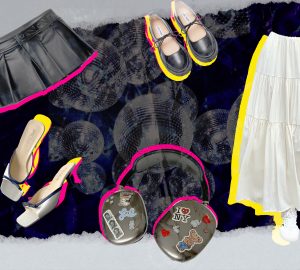
We are constantly looking for ways to move the world forward, and currently, it is through technology. We have seen apps, artificial intelligence and augmented reality penetrate into the fashion landscape, but now we are moving more into the unknown by venturing into a world that has nothing tangible to it.
Mark Zuckerberg presented his new brainchild, the Metaverse, at the end of last year.
“It’s the next big breakthrough in technology. It’s a joke. It’s a marketing strategy. It’s a techno-dystopian nightmare. It’s the metaverse — defined most simply as a virtual world where people can socialize, work and play — and Facebook’s CEO Mark Zuckerberg believes it is the future of the internet and of his trillion-dollar company.”
Vox
The Metaverse is a virtual space that operates like the real world with the exchange of real money with only virtual results. We have previously purchased coins or skins in video games, but in the metaverse, we can buy real estate and clothing for the price it would cost in the real world, not the $3 we were spending before on games.
Every company is trying to make its way into the metaverse as it is predicted to become an essential part of the future. Fashion has always been a tangible good that people spend money on, but now you can purchase your favorite Balmain dress in the metaverse for what you would pay for it in the real world. The metaverse is an alternate reality, and through digital purchases, you will be able to dress your avatar the way you would dress in your day-to-day life.
“Recent weeks have seen Victoria’s Secret filing trademark applications in the metaverse, Gucci purchasing a plot of land in The Sandbox, and Roksanda debuting an NFT collection at the upcoming London Fashion Week.”
RETAIL TECHNOLOGY INNOVATION HUB
The biggest way fashion is trying to get involved in the metaverse is through NFTs.
“NFTs are all about certifying ownership of an asset, receiving something that is personally assigned to you and only you. This is perfect for fashion in the metaverse, Dhami reckons.
The ability to buy fashion, or ‘NFT clothing’, is equivalent to getting a custom-made dress or suit, she states.
These clothing items will not only allow people to build up virtual premium fashion wardrobes to express themselves in the metaverse, but these digital versions may become more valuable than their real-life counterparts due to their ‘non-fungible’ nature. We have already seen this when the Baby Birkin NFT sold for more than an actual Birkin bag.”
W Magazine
NFTs are allowing designers to forget about practicality and create pieces that are custom and creative. Designers don’t have to adhere to traditional fashion rules and can truly avant-garde pieces.
“If we move to a virtual design, we can be creative with no restrictions,” he says. “There won’t be wasteful fabric to think about, and we won’t have to contend with things like sweatshops.” And at a time when mass retailers regularly rip off the work of up-and-coming creators with no consequences, “a designer’s intellectual property is protected in the virtual world in a way that is ignored in real life,” he points out. “So for me, this is very exciting.”
Terrence Zhou, W Magazine
Fashion NFTs are also allowing consumers to buy into a brand through a form of investment. However contentious the stability of NFTs might be, it is an investment that consumers are spending thousands on.
Along with NFTs, brands are also creating skins for avatars that consumers can purchase. Jonathan Simkai even presented his latest fashion show virtually in the metaverse for consumers to purchase clothing from. “Roksanda has announced their intention to join the metaverse by creating a demi-couture finale look with LFW’s principal sponsor, Clearpay. The specially-designed ensemble will make its debut appearance on the fall/winter 2022 runway, where it will be available in a digital version, too, which allows for users to try on the look virtually.” (Vogue)
Brands such as Gucci and Mac are also trying to enter the market by creating spaces for virtual fashion and beauty.
When speaking to fashion professionals in the industry, it is hard to understand the viability of fashion in this space. Though the majority of companies want to integrate themselves into the virtual world, many companies feel this is inauthentic to their brand image and DNA. Some are complaining that fashion brands would do anything to enter this space and that this is not actually helping their company profit or move forward.
Though the future success of Metaverse remains unclear, one thing is certain: fashion has to move with technology to stay relevant, whether that means jumping on the most recent TikTok trends or making NFTs. The future seems exciting and scary to me and I cannot wait to see what happens.
























